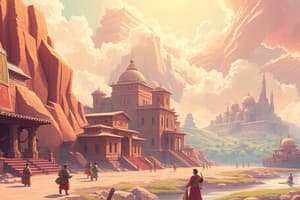Podcast
Questions and Answers
What is history primarily concerned with?
What is history primarily concerned with?
- Understanding future possibilities
- Analysis of current events
- Development of economic theories
- Study of past events in human affairs (correct)
Which era in history is characterized by the rise of feudalism?
Which era in history is characterized by the rise of feudalism?
- Middle Ages (correct)
- Classical Antiquity
- Renaissance and Reformation
- Ancient History
What is a primary source in historical studies?
What is a primary source in historical studies?
- Original materials like artifacts and letters (correct)
- Historians' interpretations
- Textbooks summarizing events
- Statistical analyses
Which concept in history focuses on identifying what remains stable over time?
Which concept in history focuses on identifying what remains stable over time?
Who is known as the 'Father of History'?
Who is known as the 'Father of History'?
What is one challenge often faced in historical study?
What is one challenge often faced in historical study?
Which technological advancement had a profound impact on history?
Which technological advancement had a profound impact on history?
What does historiography involve in historical studies?
What does historiography involve in historical studies?
Flashcards are hidden until you start studying
Study Notes
Definition of History
- The study of past events, particularly in human affairs.
- Involves analysis of sources (documents, artifacts) and interpretations.
Importance of History
- Provides context for contemporary issues.
- Helps understand cultural heritage and identity.
- Aids in learning from past mistakes and successes.
Major Eras in History
-
Prehistoric Era
- Before recorded history.
- Involves the Stone Age, Bronze Age, and Iron Age.
-
Ancient History
- Begins with the invention of writing (c. 3000 BCE).
- Key civilizations: Mesopotamia, Egypt, Indus Valley, China, and Mesoamerica.
-
Classical Antiquity
- Greek and Roman civilizations (c. 8th century BCE - 5th century CE).
- Contributions to politics, philosophy, arts, and sciences.
-
Middle Ages
- c. 5th century - 15th century.
- Feudalism, the rise of Christianity, and the Islamic Golden Age.
-
Renaissance and Reformation
- c. 14th century - 17th century.
- Revival of art and learning; challenges to the Catholic Church.
-
Modern History
- 18th century to present.
- Includes the Age of Enlightenment, Industrial Revolution, World Wars.
Historiography
- The study of how history is written and interpreted.
- Varies by cultural perspectives, ideologies, and methodology.
Key Concepts in History
- Cause and Effect: Understanding why events happened.
- Continuity and Change: Identifying what remains stable and what evolves over time.
- Historical Perspective: Recognizing biases and viewpoints in historical narratives.
Sources of Historical Knowledge
- Primary Sources: Original materials (letters, photographs, artifacts).
- Secondary Sources: Interpretations and analyses of primary sources (books, articles).
Notable Historians
- Herodotus: Known as the "Father of History".
- Thucydides: Wrote about the Peloponnesian War; emphasized factual accuracy.
- Edward Gibbon: Known for "The History of the Decline and Fall of the Roman Empire".
Global History
- Emphasizes interconnectedness of world events across different cultures.
- Topics include trade routes, colonization, and migration.
The Role of Technology in History
- Changes in technology affect human developments (e.g., the printing press, steam engine, internet).
Challenges in Historical Study
- Bias in historical records; cultural domination affecting narratives.
- Importance of interdisciplinary approaches (e.g., archaeology, anthropology).
Definition of History
- History is the study of past events, especially those involving humans.
- Historians analyze sources, such as documents and artifacts, to understand the past.
Importance of History
- History gives context to current issues.
- It helps us understand our cultural heritage and identity.
- History allows us to learn from past mistakes and successes.
Major Eras in History
- Prehistoric Era: This era predates recorded history and includes the Stone, Bronze, and Iron Ages.
- Ancient History: Began with the invention of writing around 3000 BCE, and includes major civilizations like Mesopotamia, Egypt, Indus Valley, China, and Mesoamerica.
- Classical Antiquity: This era focuses on Greek and Roman civilizations from the 8th Century BCE to the 5th Century CE, known for contributions to politics, philosophy, arts, and sciences.
- Middle Ages: This era lasted from the 5th to the 15th Century and is characterized by feudalism, the rise of Christianity, and the Islamic Golden Age.
- Renaissance and Reformation: From the 14th to the 17th Century, there was a revival of art and learning, challenging the Catholic Church.
- Modern History: This era spans from the 18th Century to the present and includes the Age of Enlightenment, Industrial Revolution, and World Wars.
Historiography
- Historiography examines how history is written and interpreted.
- It recognizes that perspectives, ideologies, and methodologies influence historical narratives.
Key Concepts in History
- Cause and Effect: Understanding the reasons why events happened.
- Continuity and Change: Determining what aspects of life remained constant and what evolved over time.
- Historical Perspective: Recognizing biases and viewpoints present in historical accounts.
Sources of Historical Knowledge
- Primary Sources: Original documents, artifacts, or other materials from the time period being studied (letters, photographs, etc.).
- Secondary Sources: Interpretations and analyses of primary sources (books, articles, etc.).
Notable Historians
- Herodotus: Known as the "Father of History".
- Thucydides: Wrote about the Peloponnesian War, emphasizing factual accuracy.
- Edward Gibbon: Famous for "The History of the Decline and Fall of the Roman Empire".
Global History
- It emphasizes the interconnectedness of world events across various cultures.
- Topics include trade routes, colonization, and migration.
The Role of Technology in History
- Changes in technology profoundly affect human developments. Examples include the printing press, the steam engine, and the internet.
Challenges in Historical Study
- Historical records can be biased due to cultural power dynamics.
- It is crucial to consider interdisciplinary approaches like archaeology and anthropology to gain a more holistic understanding of history.
Studying That Suits You
Use AI to generate personalized quizzes and flashcards to suit your learning preferences.




